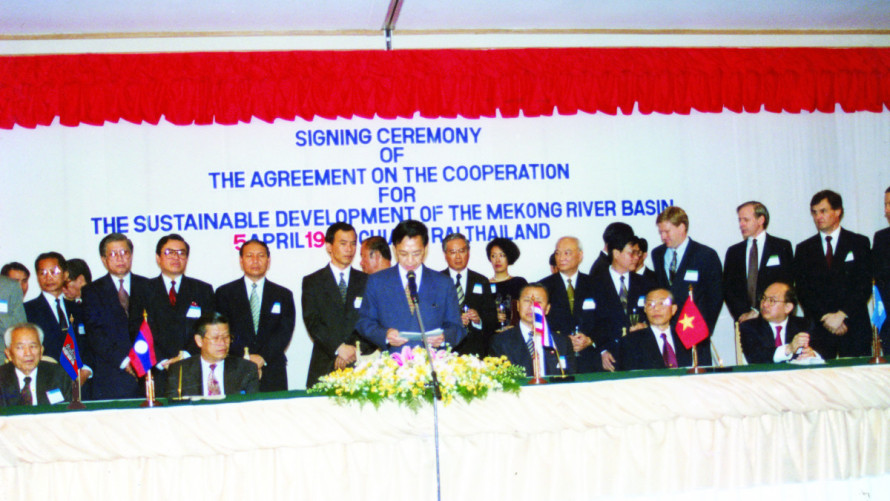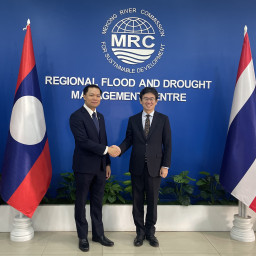Op-Ed: 60+ years of water cooperation puts Mekong basin on track to achieve the Sustainable Development Goals

The 3rd MRC Summit will boost joint action and partnerships in pursuit of sustainable, equitable, and economically beneficial water management in the Mekong River basin.
In September 1957, representatives from the four countries in the lower Mekong basin met in Bangkok to take the first steps towards cooperative development and management of their shared water resources. The agreement they signed established the Mekong Committee, the predecessor of the Mekong River Commission (MRC), and laid the foundation for more than 60 years of water cooperation in the region.
Today, standing on the shoulders of those early efforts, the MRC is well established and recognised as a premier knowledge hub and water diplomacy platform in the Mekong River basin. Indeed, it is the oldest river basin organisation in Asia.
At the upcoming 3rd MRC Summit and its international conference, we will offer up our cooperation framework, knowledge, and experience to support the Mekong riparian countries to successfully achieve the Sustainable Development Goals (SDGs), not least SDG 6 on water.
Throughout the years, it has become increasingly clear that the biggest water cooperation challenge in Mekong basin is striking the balance between diverging national development objectives as well as between economic growth and social and environmental sustainability. Without doubt, the Mekong basin’s waters carry great value and potential—for agriculture, fisheries, hydropower, navigation, flood and drought management and more—but trade-offs are abundant.
Too often, one person’s benefit is another’s problem.
Since Cambodia, Laos, Thailand, and Vietnam signed the MRC into being in 1995, we have relied on the principles of integrated water resources management to tackle this challenge. This process of inclusive, coordinated management and development of water, land, and related resources has received renewed recognition since it was included as a specific objective under SDG 6.
The MRC recognises the role water management plays for sustainable development and for the achievement of the SDGs, but to us, this is not new: integrated water resources management always has been, and continues to be, at the core of our operations.
For example, the MRC recently completed a study on the sustainable management and development of the Mekong River, known as the Council Study. It was conducted in collaboration with national line agencies working not only with water, but also energy, irrigation, fisheries, and environment, and it was refined through multi-stakeholder consultations.
The study highlights the trade-offs and potential win-wins of the futures that different development scenarios offer, and its findings will be discussed at the upcoming international conference. Further, the study shows joint efforts and partnerships are critical if development of the river is to be sustainable.
Yet, we know from experience that agreement on certain decisions can be hard to come by.
That’s why the MRC and its member countries have established certain ground rules, namely five sets of water-related procedures. They include the Procedures for Notification, Prior Consultation and Agreement (PNPCA), which allows the MRC member countries to discuss and evaluate any proposed water-use project on the Mekong mainstream that may come with significant trade-offs.
Last year, the MRC led the PNPCA process for the third time, this time focused on the Pak Beng hydropower project, proposed to be constructed on the Mekong mainstream in Laos. While still not perfect, stakeholders have indicated that the process has significantly improved over the years, for example through more timely disclosure of information, more transparent discussions, extensive stakeholder involvement, and an agreed statement by the member countries on the way forward.
This progress towards successful cooperation is the result of decades of work to establish the MRC as a trusted facilitator with the standing required to perform water diplomacy. It represents the kind of open cooperation that will continue to be essential for steering the basin towards a more sustainable future.
The 3rd MRC Summit and its international conference will be a chance for our member countries and partners to reaffirm their commitment to the cooperation framework we have built together. We especially welcome your continued partnerships and engagement during this ongoing process.
Think of your commitment not only as a way to tick off progress towards the SDGs, but as a way to continue our journey towards sustainable development and management of water and related resources for the countries’ mutual benefit and for the people’s well-being.
Dr Pham Tuan Phan is Chief Executive Officer of the Mekong River Commission Secretariat. The 3rd MRC Summit begins next Thursday in Siem Reap, Cambodia.
This op-ed appears on The Nation on its 29 March 2018’s issue.




